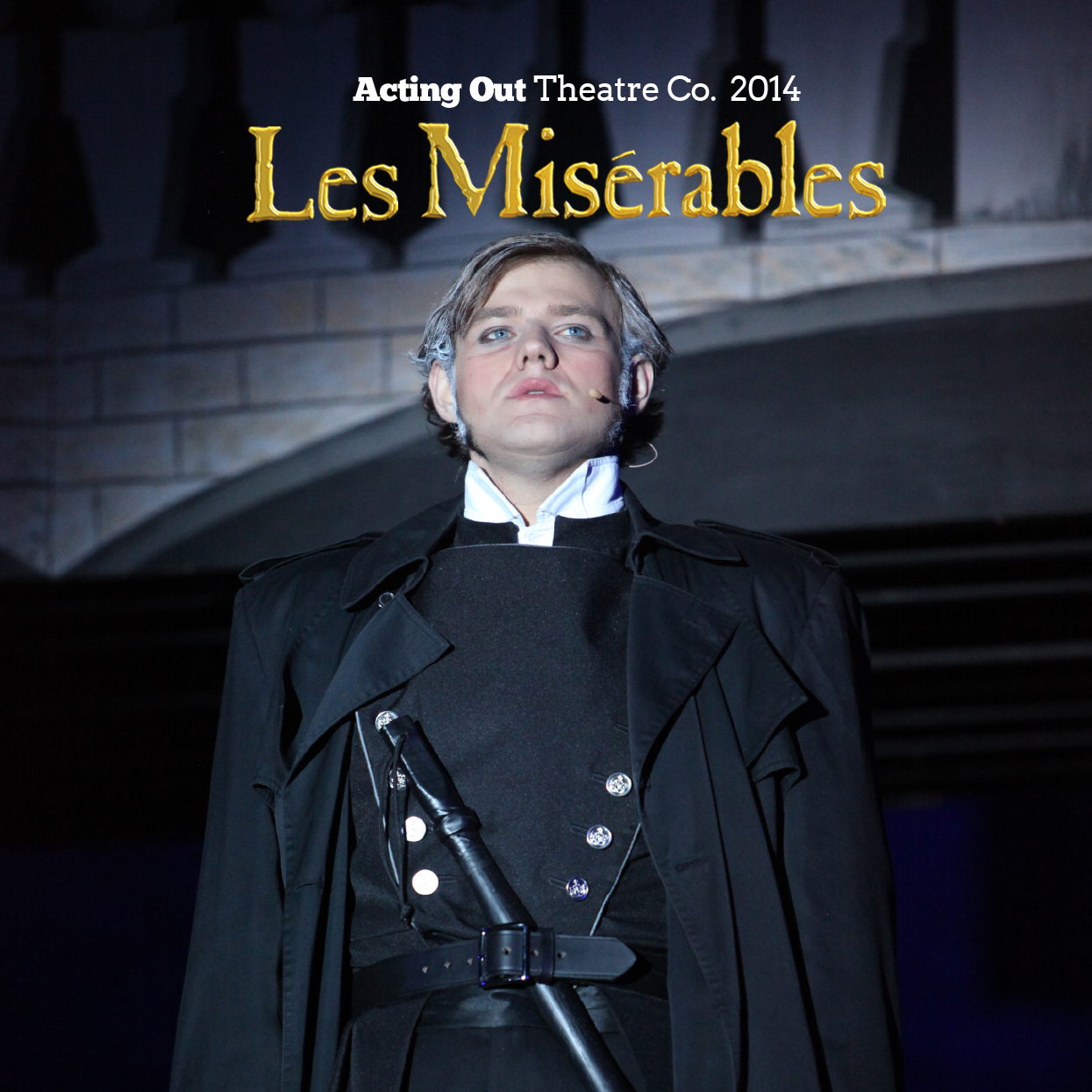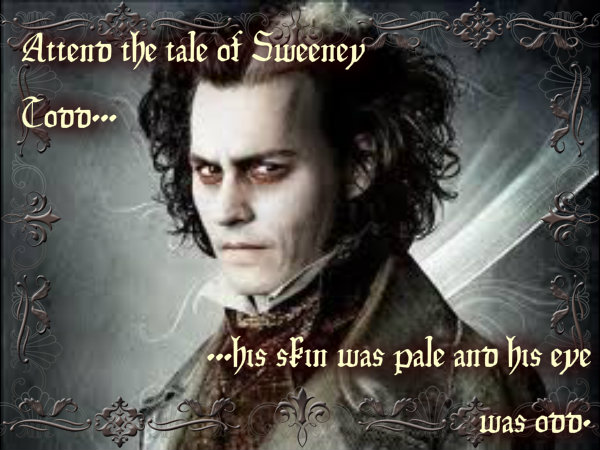As Oscar Wilde once said “There are only two tragedies in life: one is not getting what one wants, the other is getting it.”
It is no mistake that playing the role of Sweeney Todd is something that I have yearned for ever since I first heard the score and watched the characters unfold in this twisted yet still somehow tragically hilarious drama. My first exposure was the Tim Burton film since the Broadway debut of this infamous musical was fourteen years before I was born. However, once a particular show, character, score, etc. has captured a piece of you there’s no limit to the exposure you’ll put yourself through, if only to feel that much closer to the piece as a whole, and maybe learn something about yourself.
So why the “duality of mankind” Oscar Wilde quote.
In life we may be presented with a whole string of “good things” and it is the mysterious and sometimes perverse nature of mankind to gaze upon something one wants and still not feel the urgency of joy you grew accustomed to expect. Reasons of this abound, but what remains within it, at the proverbial heart of it, is a natural desire. Not the desire to succeed, but the infinitely more powerful desire to not fail.
In my short (unprofessional) career on the stage there have been scads upon scads that congratulate me on my successes and my “reincarnations” as I trot the boards. However, one fact remains bluntly clear, that all the ovations and accolades in the world don’t mean a damn thing if you were unable to bring yourself even half-way to the level of Parnassus that the audience felt.
An actor may obsess about the tiniest minor detail of their performance, about how to get it just right, and drive themselves to the point of madness attempting to make it perfect (or as close to perfect as theatre allows). I have always remarked that theatre is much like sporting events in a few ways: there is an audience, we take a break in the middle, and most of the time snacks are served. But the biggest way in which it differs is that rather than compete against an opposing team to which there can only be one victor, in theatre (and in most, if not all forms of art in general) you are competing against perfection. The maddening part about any art form is that you will never win, you will never beat perfection. You will come excruciatingly close at times, but ultimately you will never win.
I’m reminded of my performance in Acting Out’s Les Miserables in which I played the role of Javert. I remember so vividly obsessing to great lengths about my character’s suicide. I drove a few of my co-stars absolutely crazy asking every single time if what I had done this time was better than the last, to which most of the time the change was so miniscule that it wasn’t even noticeable to anyone but me. Eventually I got it to a nice comfortable place, however, even remarking about it now brings to mind things I could have done to make it better. This is the plight of the live performer, summed up as best it can be. Because it will never be perfect will it.
.
So with this enormous honor of playing this iconic character, whose roots can be traced back almost 170 years, there comes an immense amount of fear, but as time passes and I’m able to bring into it my own analyses and interpretations (even if only in my own head for now) there comes those flashes of excitement that I hope to bloom into a reincarnation of Sweeney that has never been seen before.
+++
In interpreting this character, and in fact this show in its entirety, with a casual eye it may seem that this is a story of classic revenge, and to a point they would be right; the whole thing does possess a kind of Elizabethan revenge drama nuance to it. But on a deeper level I believe this is a story about emotions, and what people are ultimately capable of when emotions are shattered. What truly does happen to someone when you shatter them? Because when such tragedies to occur we ultimately have two choices when we make the decision to move on: we can either begin the process of repairing ourselves and salvaging what parts of you still breathe, or allow ourselves to be completely shattered and rebuild who we are from there. By his adamant name change it is safe to surmise that Mr. Todd chose the latter, his mistake was remaining fixated on what was done to him. His inability to accept what became of his wife and child and the dream that was his happiness drove him into the self-propelling hurricane that ultimately ended with even more tragedy.
But who can truly blame him? This wasn’t a sickness that took his wife, it was a living breathing man. When random tragedies occur (car accidents, sickness, strike by lightning, etc.) there is a tendency to blame an entity when a person doesn’t exist. Most people choose God, since it is easy to blame an all-knowing, all-powerful deity who simply “sat there and watched it happen.” However, not everyone does, some people blame, circumstance, society, or even themselves. Sweeney Todd had the unfortunate circumstance which drove him to blame…well everyone really.
At first he blamed the linear humans that were responsible, then as time passed, he made some other realizations to bring him into an epiphany that made him realize that it wasn’t just this man who hurt him: it was society for allowing such corruption, it was law and order for not helping him when he needed it, it was God for standing idly by, and it was himself for not being strong enough, powerful enough, or influential enough to have stopped it. Which is why the song Epiphany is so significant, it is Sweeney Todd quite literally declaring war on the world.
My own interpretations on this character go beyond the clear and obvious motivations of revenge, they have to considering that I personally don’t believe that is all that is in play here. The emotions that run red as blood in feelings of revenge are not usually this powerful. There is something else at stake here and I interpret it as Sweeney being desperate to rekindle any emotion in his own self. When someone is depressed and you are able to make them laugh it doesn’t mean that the depression is gone, it means you have given them a temporary reprieve, but it will come back. Sweeney can’t think far enough ahead to any long term solutions, he cannot conceive of his existence beyond that of killing this man. If you were to ask him what he plans to do after he killed the judge, he wouldn’t know what to tell you, because to him there is nothing else.
So then why the homicidal rampage. When one is desperate to feel something, they may turn to all kinds of sources to spark even the tiniest bit of emotion. These range from, drugs, alcohol, prescriptions, or even less direct sources such as purposely putting themselves into a dangerous situation, or purposely setting themselves up for failure or disappointment. Because the goal of someone in this state (much like Sweeney himself) is not to feel happy, the goal is to feel anything.
Fifteen years in prison is a lot of time to think, and I personally get the idea that there were many thoughts that tortured him, and a vast amount that gave him comfort. Even if those that gave him comfort were dark and “immoral” they were a comfort nonetheless. Now that he is free, those feelings that gave him comfort as well as those associated with being a prisoner still remain (institutionalization). It is the breaking of these emotional chains that drive him to kill.

Dominance is the first thing that is taken from you in a prison type situation. Killing someone else is the ultimate expression of dominance over another human being. You for a moment played God and decided to end their life. Another thing that is taken from you is connection, emotional and physical. Killing someone provides a level of intimacy (stay with me here) to another person. It is one of the ways we can be closest to someone. Because you are going to see a part of them that no one else will ever see and when we see those secret parts of another person’s soul it kindles the most intimate relationships that can possibly exist.
I believe the 3 most intimate things you can do to someone are: kill them, eat them, or make love to them, and it is rare that one does not incorporate one with elements of the other two. I get a lot of cocked heads with this theory and to that I can only respond with. “Life is rarely so black and white.” This show is a perfect example of it. Humor isn’t always pies in the face and slipping on banana peels, sometimes its two people cracking jokes about whether or not people taste different based on their profession. Same goes with beauty, death can be beautiful, murder can be beautiful. Beauty isn’t always a sunset peeking down over the mountains on a clear blue day, sometimes it’s watching a man drive himself mad in a poetic quest for feeling, and sometimes it’s a stream of crimson blood staining the blank white drop cloth of an unsuspecting soul, then hearing the subtle click of gears as the mechanical chair drops the corpse down into the black darkness, almost as if personally dropping him into his inevitable grave.
If that whole thing about death and murder being beautiful made you uncomfortable then theatre isn’t right for you. May I suggest dentistry?
Ultimately the reason why I believe Sweeney does what he does is because it makes him feel alive, not necessarily a rush of adrenaline, but a rush of anything that could lead him to a feeling or normality again, of contention. There is a great deal more to it than that but at its heart I believe he just wants to feel like a human being again, and he’ll do just about anything to do it. Feeling alive is a precious commodity that we sometimes take for granted, that is until it is stripped away from us. The tragic irony of all this is that he has to be inhuman to feel human, but to him death is the price to pay for his emotions.
What’s your price?
Tah tah


